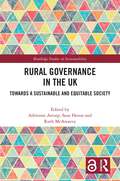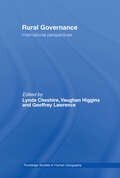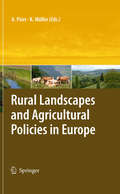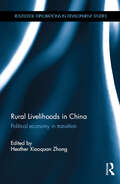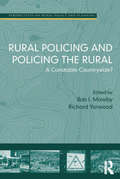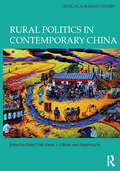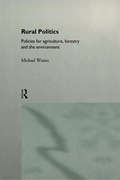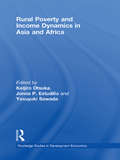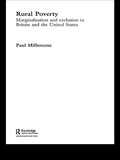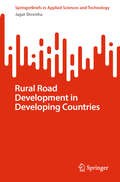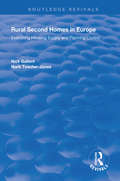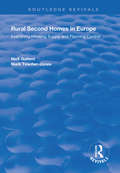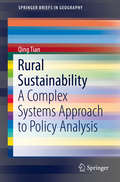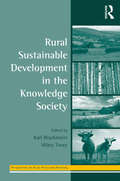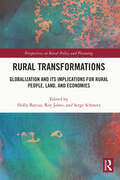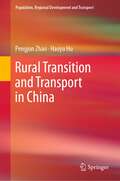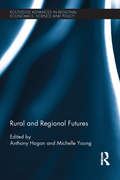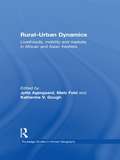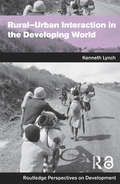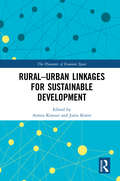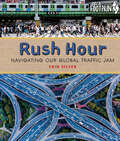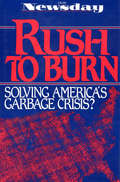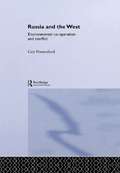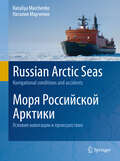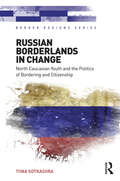- Table View
- List View
Rural Governance in the UK: Towards a Sustainable and Equitable Society (Routledge Studies in Sustainability)
by Ruth McAreavey Sean Heron Adrienne AttorpThis book provides a multidisciplinary analysis of rural society in a post-Brexit UK by examining the emergence of new environmental and rural policies and the implications of this transition for rural communities. Through the Common Agricultural Policy, Common Fisheries Policy, the Birds and Habitats Directives, the Water Framework Directive and a myriad of other legislations and institutions, the EU has had a deciding role in how the UK’s rural environment is governed. Disentangling this policy legacy is a complex process and offers both opportunities and challenges for policy makers, institutions, organisations and stakeholders across the UK as they strive to create appropriate new governance structures. With the Agriculture Bill, the 25-Year Environment Plan and the founding of the Office of Environmental Protection, the UK government has provided at least a degree of clarity on the future direction of environmental governance, but much remains uncertain, not least how this is engaged with by different stakeholders. While Brexit is the lens through which rural policy and sustainability are interrogated, this collection demonstrates the underpinning features of rural policy and society, identifying opportunities for addressing deep-seated policy weaknesses thereby creating a more sustainable and equitable rural society. This book brings together academics, established and early career, to discuss the impact of Brexit on rural environmental governance and on the wider sustainability of rural society, relating to three overall themes: rural governance, sustainable land use, and sustainable rural communities. In doing so, it considers sectors beyond agriculture, paying attention to social relations, community infrastructure, the environment, rural development and broader issues of land use. This book will be of interest to students and scholars of rural development, rural entrepreneurship, rural digital inclusion, environmental policy, sustainable development, land use, agrarian studies and environmental geography.
Rural Governance: International Perspectives (Routledge Studies in Human Geography #Vol. 12)
by Geoffrey Lawrence Vaughan Higgins Lynda CheshireRecent decades have witnessed the transition from the government of rural areas towards processes of governance in which the boundaries between the state and civil society are blurred. As a result, governance is commonly linked to ‘bottom-up’ or community-based approaches to planning and development, which are said to ‘empower’ rural citizens and liberate them from the disabling structures of top-down government control. At the same time, however, a range of other actors beyond the local level have also become increasingly influential in determining the future of rural spaces, thereby embedding rural citizens within new configurations of power relations. This book critically explores the social causes and consequences of these emerging governance arrangements. In particular, the book seeks to move beyond questions of empowerment in governance debates and to consider how new kinds of power relations arise between the various actors involved. The book addresses questions concerning the nature of power relations in contemporary forms of rural governance, including: how community participation is negotiated and achieved; the effects of such participation upon the formulation and delivery of rural policies; the kinds of conflicts that arise between various stakeholder groups and the capacity of each group to promote its interests; and the prospects of this new approach for enhanced democratic governance in rural areas.
Rural Landscapes and Agricultural Policies in Europe
by Annette Piorr Klaus MüllerThe reform of the European agricultural policy aims at stimulating the development of European towards more sustainability and more competitiveness in global markets, by ensuring environmental soundness, supporting rural viability and better meeting consumers demands. Parallel to this farming in the ever growing EU is undergoing major changes. The conditions for production are occurring faster than ever, including developments such as climate change, new markets (bioenenergy), structural changes and ageing rural societies. Agriculture in an ever changing Europe has to develop multifunctional regional strategies. About 40 scientists from 11 European research institutions compiled this joint publication to provide an overview of concepts and approaches for multi functionality impact assessment, which includes surveys on societal demands in different parts of Europe. A central part presents research results on the impact of current agricultural policies and future scenarios, assessed by micro-economic and environmental modeling procedures (agent based, linear programming, trade-offs). They provide information on the issues of how and why farmers in varying structural and geophysical frameworks respond to the new CAP (Common Agricultural Policies) reform. One large chapter specifies the developments in 7 case study regions in Denmark, France, Germany, Hungary, Italy, Poland and Slovakia.
Rural Livelihoods in China: Political economy in transition (Routledge Explorations in Development Studies)
by Heather Xiaoquan ZhangIn recent decades, China has undergone rapid economic growth, industrialisation and urbanisation concomitant with deep and extensive structural and social change, profoundly reshaping the country’s development landscape and urban-rural relationships. This book applies livelihoods approaches to deepen our understanding of the changes and continuities related to rural livelihoods within the wider context of political economy of development in post-socialist China, bridging the urban and rural scenarios and probing the local, national and global dynamics that have impacted on livelihood, in particular its mobility, security and sustainability. Presenting theoretically informed and empirically grounded research by leading scholars from across the world, this book offers multidisciplinary perspectives on issues central to rural livelihoods, development, welfare and well-being. It documents and analyses the processes and consequences of change, focusing on social protection of mobile livelihoods, particularly rural migrants’ citizenship rights in the city, and the environmental, social and political aspects of sustainability in the countryside. This book contributes to the current scholarly and policy debates, and is among the first attempts to critically reflect on China’s market transition and the associated pathways to change. It will be of interest to students in international development studies, China studies, social policy, public health, political science, and environmental studies at undergraduate and postgraduate levels, as well as academics, policy makers and practitioners who are concerned with China’s human and social development in general, and agriculture and rural livelihoods in particular.
Rural Policing and Policing the Rural: A Constable Countryside? (Perspectives On Rural Policy And Planning Ser.)
by Rob I. MawbyPolicing reveals much about rural society. It refers to the way that the police, the public and other agencies regulate themselves and each other according to the dominant ideals of society. This can be formally, through the ever-growing spectrum of policing partnerships in neo-liberal countries, or informally, through the performance and enforcement of moral codes and values. This book draws on international inter-disciplinary perspectives to examine the range and consequences of policing across different rural localities. Rural Policing and Policing the Rural is organised into two sections: the first examines who is policing rural areas, while the second examines the nature of rural policing by considering, on the one hand, the policing of rural space and, on the other, how ideas of rurality are regulated. In doing so this book provides a survey of rural policing that will be valuable to academics, students, policy makers and those policing rural places.
Rural Politics in Contemporary China (Critical Agrarian Studies)
by Emily T. Yeh, Kevin J. O’Brien and Jingzhong YeThis collection provides an overview of China’s rural politics, bringing scholarship on agrarian politics from various social science disciplines together in one place. The twelve contributions, spanning history, anthropology, sociology, environmental studies, political science, and geography, address enduring questions in peasant studies, including the relationship between states and peasants, taxation, social movements, rural-urban linkages, land rights and struggles, gender relations, and environmental politics. Taking rural politics as the power-inflected processes and struggles that shape access and control over resources in the countryside, as well as the values, ideologies and discourses that shape those processes, the volume brings research on China into conversation with the traditions and concerns of peasant studies scholarship. It provides both an introduction to those unfamiliar with Chinese politics, as well as in-depth, new research for experts in the field.This book was published as a special issue of the Journal of Peasant Studies.
Rural Politics: Policies for Agriculture, Forestry and the Environment
by Michael WinterThe rural areas of Britain, Europe and the developed world are undergoing massive changes, with increasing concern about productivity, agricultural methods and environmental policy. Rural Politics examines the issues affecting rural areas, such as water pollution, forestry, and the greening of agricultural policy. It looks in particular at the political parameters to these issues and how concern for the countryside is essentially a part of a wider set of political processes. Rural Politics provides a much needed examination of the evolution and content of policies affecting today's countryside, both in terms of major land uses and economic and social development.
Rural Poverty and Income Dynamics in Asia and Africa (Routledge Studies in Development Economics)
by Keijiro Otsuka Yasuyuki Sawada Jonna P. EstudilloAlthough there is much interest in poverty reduction, there are few agreed upon strategies to effectively reduce poverty. In this new book, the editors have gathered together various evidences on poverty dynamics, based on panel data from the last few decades in the Philippines, Thailand, Bangladesh and Tamil Nadu in India, compared with more recent data from sub-Saharan Africa. The major finding of this research project is that rural households in sub-Saharan African are beginning to experience the same pattern of structural change in income composition and poverty reduction that Asian households have experienced in the past 20-25 years. The chapters in the book explore how the spread of Green Revolution has triggered the subsequent transformation of rural economies. Many rural households in Asia have been able to move out of poverty in the presence of increasing scarcity of farmland initially by increasing rice income through the adoption of modern rice technology and gradually diversifying their income sources away from farm to non-farm activities. Increased participation in non-farm employment has been more pronounced among the more educated children, whose education is facilitated by an increase in farm income brought about by the Green Revolution. This book identifies the importance of Green Revolution and non-farm employment for poverty reduction in Asia, which provides valuable lessons for sub-Saharan Africa.
Rural Poverty: Marginalisation and Exclusion in Britain and the United States (Routledge Studies in Human Geography #Vol. 7)
by Paul MilbourneMoving beyond the highly visual forms of poverty characteristic of the city, Rural Poverty explores the nature of poverty in rural spaces in Britain and America. Setting out key features, it highlights the important processes that hide key components of rural poverty. The book seeks to challenge dominant assumptions about the spatialities of poverty and the nature of rural spaces in Britain and America. Drawing on a broad range of new research material, the book challenges dominant assumptions. It provides a comprehensive and critical review of the nature of poverty in rural spaces, giving particular attention to: the scale, profile and causes of poverty in rural areas the spatial unevenness and local geographies of rural poverty the experiences of different forms of poverty in rural spaces the shifting governance of rural welfare at central and local spatial scales. Demonstrating that poverty represents a significant but neglected feature of rural life in Britain and America, this insightful book highlights the processes through which rural poverty remains hidden from the dominant gazes of poverty researchers and policy-makers, the statistical significance and spatial unevenness of poverty in rural areas, the ways in which poverty is experienced in local rural spaces, and the complex governance of welfare in rural spaces. Case study material is drawn from a wide range of locations, including Wiltshire, Northumberland and Hampshire in the UK and New England in the US.
Rural Road Development in Developing Countries (SpringerBriefs in Applied Sciences and Technology)
by Jagat ShresthaThis book provides guidelines for the planning, design and construction of rural roads in hilly regions. It is a useful resource for researchers and practitioners working in the field as it presents different rural road network concepts for new construction and upgrades of existing infrastructure. the book introduces the covering-based rural road network method that discovers nodal points to cover settlements and public facilities within a given region by developing a basic rural network. It also explores different mathematical models including a multi-objective approach for solving a rural road network upgrading problem for typical rural road network structures for hilly regions. It also presents case studies to help readers grasp the basic principles presented in the text. This book can also additionally be utilised as a reference resource for graduate and undergraduate students interested in rural transportation.
Rural Second Homes in Europe: Examining Housing Supply and Planning Control (Routledge Revivals Ser.)
by Nick Gallent Mark Tewdwr-JonesThis title was first published in 2000: Improved communication links between urban and rural areas and an increase in property prices in urban regions have made commuting an attractive option for European town and city dwellers eager to 'escape' urban living. This has lead to a proliferation of second homes in certain remote or deep rural areas, and this trend is compounding problems that are already affecting the indigenous populations in these areas - such as socio-economic decline, agricultural depression, a lack of services, and unaffordable house prices. Consequently, many politicians in European Member States are calling for the introduction of housing and planning laws to control the proliferation of second home ownership. This book addresses the origins of second home growth, the nature of ownership and demand, the economic costs and benefits and the environmental and social impacts of second homes. It also considers policy and practical responses at European, UK and local levels. The book will be invaluable reading for students and policy analysts in the fields of rural geography, planning, politics, housing studies and cultural studies.
Rural Second Homes in Europe: Examining Housing Supply and Planning Control (Routledge Revivals)
by Nick Gallent Mark Tewdwr-JonesThis title was first published in 2000: Improved communication links between urban and rural areas and an increase in property prices in urban regions have made commuting an attractive option for European town and city dwellers eager to 'escape' urban living. This has lead to a proliferation of second homes in certain remote or deep rural areas, and this trend is compounding problems that are already affecting the indigenous populations in these areas - such as socio-economic decline, agricultural depression, a lack of services, and unaffordable house prices. Consequently, many politicians in European Member States are calling for the introduction of housing and planning laws to control the proliferation of second home ownership. This book addresses the origins of second home growth, the nature of ownership and demand, the economic costs and benefits and the environmental and social impacts of second homes. It also considers policy and practical responses at European, UK and local levels. The book will be invaluable reading for students and policy analysts in the fields of rural geography, planning, politics, housing studies and cultural studies.
Rural Sustainability
by Qing TianThis volume applies the science of complexity to study coupled human-environment systems (CHES) and integrates ideas from the social sciences of climate change into a study of rural development amid flooding and urbanization in the Poyang Lake Region (PLR) of China. Author Qing Tian operationalizes the concept of sustainability and provides useful scientific analyses for sustainable development in less developed rural areas that are vulnerable to climatic hazards. The book uses a new sustainability framework that is centered on the concept of well-being to study rural development in PLR. The PLR study includes three major analyses: (1) a regional assessment of human well-being; (2) an empirical analysis of rural livelihoods; and (3) an agent-based computer model used to explore future rural development. These analyses provide a meaningful view of human development in the Poyang Lake Region and illustrate some of the complex local- and macro-level processes that shape the livelihoods of rural households in the dynamic process of urbanization. They generate useful insights about how government policy might effectively improve the well-being of rural households and promote sustainable development amid social, economic, and environmental changes. This case study has broader implications. Rural populations in the developing world are disproportionally affected by extreme climate events and climate change. Furthermore, the livelihoods of rural households in the developing world are increasingly under the influences of macro-level forces amid urbanization and globalization. This case study demonstrates that rural development policies must consider broader development dynamics at the national (and even global) level, as well as specific local social and environmental contexts. By treating climate as one of many factors that affect development in such places, we can provide policy recommendations that synergistically promote development and reduce climatic impacts and therefore facilitate mainstreaming climate adaptation into development.
Rural Sustainable Development in the Knowledge Society (Perspectives On Rural Policy And Planning Ser.)
by Hilary ToveyBased on the EU-funded CORASON research project, this volume brings together and compares studies into rural and sustainable development processes in 12 European countries. In doing so, it identifies key trends and reveals the changing nature of development processes on the way towards a knowledge society. The book examines the differences between the preconditions and contexts relevant to rural development strategies and those relevant to sustainable development strategies. It explores whether the concept, goals and nature of rural development is better understood and adopted by rural actors than those of sustainable development. Finally by focusing on the ideas and practices of sustainable resource management- a component in both rural and sustainable development objectives- it links with knowledge used by actors involved in rural development.
Rural Transformations: Globalization and Its Implications for Rural People, Land, and Economies (Perspectives on Rural Policy and Planning)
by Roy Jones Holly Barcus Serge SchmitzThis book focuses on the transformation of rural places, peoples, and land endemic to the contemporary manifestations of globalization. Migration, global economic restructuring, and climate change are rapidly transforming rural places across the globe. Yet, global attention characteristically focuses on urban social and economic issues, neglecting the continued roles of rural people and places. Organized around the three core themes of demographic change, rural-urban partnerships and innovations, and landscape change, the case studies included in this volume represent both the Global North and Global South and underscore the complexity and multi-scalar nature of these contemporary challenges in rural development, planning, and sustainability. This book would be valuable supplementary reading for both students and professionals in the fields of rural land management and rural planning.
Rural Transition and Transport in China (Population, Regional Development and Transport)
by Pengjun Zhao Haoyu HuThis book examines the rural transition and transportation in China. It covers demographic change, settlement transformation, and infrastructure development in rural areas, as well as changes in transportation expenditures, travel behavior, and accessibility of basic public services among rural Chinese residents. The book contributes to the new body of knowledge from an international perspective in three ways. First, it explores the changes in travel behavior of rural residents and related factors. Second, it provides new evidence on the relationship between rural social transformation and transportation infrastructure development. Third, it discusses the impact of transportation investments on rural poverty reduction. The book enhances our understanding of the changes in travel behavior of rural residents. In particular, the results of the multi-source big data analysis will provide new evidence on the link between social transformation and changes in travel behavior in rural China. It also helps planners and politicians to develop policies aimed at improving quality of life, rural poverty, and the efficiency of transportation investments in rural areas. The book is of great interest to scholars interested in rural transformation and development, sustainable transport, regional planning, and environmental policy and is relevant to China and other developing countries.
Rural and Regional Futures (Routledge Advances in Regional Economics, Science and Policy)
by Michelle Young Anthony HoganAgriculture, mining and related rural industries have been central to the development of Australia’s economy. This book details the role that the Australian Government has played in the making of rural and regional Australia, particularly since World War II. The book reviews these policies and evaluates them with regards the commitments undertaken by the Government to contribute towards vibrant, rural communities. Policy areas addressed include agriculture, water, education, welfare and population, natural resource management, resource extraction, Indigenous and affairs, localism, rural research and regional innovation, Youth Affairs and the devolution of regional governance. Overall two distinct policy strategies can be observed: one wherein the government saw its role as part of the entrepreneurial state and a sector wherein government has increasingly taken itself out of industry development, leaving this role to the market. Having considered these strategies and their impacts, the book concludes that policy over the past 40 years has not in fact contributed to a more vibrant, prosperous rural and regional Australia. Rural and Regional Futures concludes with several chapters looking to the future. One chapter explores what the role of the state can be within a social market economy while the final chapter gives consideration to the initial steps rural communities will need to take to begin the process of revitalisation. While these materials present as a case study of developments in Australia, the policy shift from the Government as entrepreneur to a focus on markets is an international one and as such, the insights offered by this book will have wide appeal.
Rural-Urban Dynamics: Livelihoods, mobility and markets in African and Asian frontiers (Routledge Studies in Human Geography)
by Niels Fold Jytte Agergaard Katherine GoughIt has increasingly been recognised that rural and urban areas are inextricably interlinked. This book adopts a fresh approach to the issue of rural-urban dynamics through a study of the changing nature of livelihoods, mobility and markets in ten study sites across four countries of Africa and Asia. Building on detailed fieldwork conducted in Ghana, Tanzania, Vietnam and Thailand, the authors explore how settlements and livelihoods are being transformed as long-term inhabitants and recent migrants embrace new economic activities many of which are linked to global markets. The book is structured around the concept of ‘frontier’ which is conceptualized as being a dynamic space where the forces of economic, demographic and social change are brought to bear. The study sites include agricultural frontiers (coffee, cocoa, pineapples and fresh fruit), handicraft and manufacturing frontiers, and mining frontiers (gold and diamonds). In all of the cases, global value chain dynamics have played a pivotal role in shaping local livelihoods. Some settlements are developing into new urban centres whilst others are suffering from a boom and bust experience due to the unreliability of export markets. The similarities and differences between the frontier settlements are drawn out by comparing frontiers of similar types and by highlighting the theoretical and policy implications of the findings from all the frontier types. The originality of the book lies in its combination of conceptual clarity, methodological coherence and empirical richness. By combining detailed empirical findings with theoretical insight from debates on livelihoods, global value chains, mobility patterns, settlement dynamics and rural-urban relations, the book sheds new light on these issues within an overall framework of development trajectories in Africa and Asia. Given scholars’ and international agencies’ current interest in the spatial dimensions of economic development, this contribution is particularly timely with its fresh geographical approach to development issues; this book is a pertinent and authoritative read for anyone researching or learning in the field of development.
Rural-Urban Interaction in the Developing World (Routledge Perspectives on Development)
by Kenny LynchSustaining the rural and urban populations of the developing world has been identified as a key global challenge for the twenty-first century. Rural-Urban Interaction in the Developing World is an introduction to the relationships between rural and urban places in the developing world and shows that not all their aspects are as obvious as migration from country to city. There is now a growing realization that rural-urban relations are far more complex. Using a wealth of student-friendly features including boxed case studies, discussion questions and annotated guides to further reading, this innovative book places rural-urban interactions within a broader context, thus promoting a clearer understanding of the opportunities, as well as the challenges, that rural-urban interactions represent.
Rural-Urban Linkages for Sustainable Development (The Dynamics of Economic Space)
by Edited by Armin Kratzer and Jutta KisterThis book critically examines different forms of urban-rural links for sustainable development in different countries. As intertwined processes of globalization, digitalization, environmental challenges and the search for sustainable development continue, rural and urban areas around the world become increasingly interconnected and interdependent. This book contributes to understanding the role of this growing interconnectedness from an economic geographical perspective. It does so by theoretically and empirically addressing the various existing linkages, such as food networks, value chains, and regional governance at local, regional, national and international levels. In doing so, contributions extend and contrast existing approaches dealing with urban and rural areas separately by considering the interplay between these two as well as their consequences for sustainability transition pathways. This edited volume adds to the academic and policy debate by bringing together a variety of concepts and themes in order to shift the research and policy agenda away from simple dichotomy to different notions of rural-urban linkages. Offering multidisciplinary insights into rural-urban linkages, the book will be of interest to decision-makers, practitioners and researchers in the fields of economic geography, regional planning, food studies and economics.
Rush Hour: Navigating Our Global Traffic Jam (Orca Footprints #23)
by Erin SilverTraffic. It's not only frustrating, it's hurting the planet. Emissions from cars, buses, trucks and planes are one of the leading causes of pollution in North America. Today there are more cars clogging the roads than ever before. In Rush Hour, learn how traffic got so bad and some of the innovative ways it's being managed around the world. Discover what technological advances like talking cars and electric buses will mean for the future of traffic. Even though they can't drive yet, kids need to take control of the wheel. From walking to school, to carpooling with friends or petitioning the government, the next generation of drivers has to think differently about traffic and understand what they can do now to help protect the environment. And it starts with changing our habits, one less car ride at a time. The epub edition of this title is fully accessible.
Rush to Burn: Solving America's Garbage Crisis?
by Newsday Inc.One day in March 1987, a barge from Islip, Long Island was evicted from Morehead City, North Carolina, after trying to unload the mountains of trash on its decks. More than five months from the time it began its trip, the unwelcome barge, and it's 3,186 tons of commercial garbage, became the cornerstone of an astonishing news investigation that revealed a country unable to cope with its mounting garbage crisis. Newsday reporters were the first to locate the barge, the Mobro 4000 as it drifted aimlessly off the shore of Long Island. They were also first to explore and explain the problems and issues that barge had come to symbolize. The results of their investigation are presented in this book. Winner of the Worth Bingham Award, the Page One Award for Crusading Journalism, and the New York State Associated Press Award for In-Depth Reporting, Rush to Burn explains the reasons why we, as a throw-away society, are suffocating in our own trash. It also explains why communities, in desperation, are turning to incineration, the riskiest form of garbage disposal yet developed.
Russia and the West: Environmental Co-operation and Conflict (Environmental Politics)
by Geir HønnelandHønneland assesses current environmental discourses and applies this analysis to look at the relations between Russia and the West with regards to environment problems. It includes three in-depth case-studies on environmental problems, living marine resources, nuclear safety and air pollution.
Russian Arctic Seas
by Nataly MarchenkoFor safe operations in the Arctic, it is critical to understand the natural conditions and to learn from the experiences of ice pilots who have worked there. In the context of planning the PetroArctic project, accounts of seagoing activities in the Russian Arctic Seas that ersulted in accidents have been gathered and are now made available in this bilingual (Russian-English) volume. Here especially, the physical environment and navigation issues for the Kara, Laptev, East Siberian and Chukchi seas are described. Fully half of the book describes accidents induced by heavy ice conditions since 1900: 94 accidents are carefully reported and classified. Among these, the accidents involve shipwrecks, forced drift (ice jet as special case), overwintering, and various types of vessel damage. Most accounts include details such as distinguishing features, behavior of the crew, photos, and maps, which reveal ice conditions, date, location, and vessels involved (for each of four seas). The book will be useful to scientists, industrial planners and a wide audience interested in the Arctic Seas.
Russian Borderlands in Change: North Caucasian Youth and the Politics of Bordering and Citizenship (Border Regions Series)
by Tiina SotkasiiraWhile moving across borders has been made easier for some in Russia in recent years, for others, physical as well as socio-cultural borders are proving to be more and more difficult to cross. Tackling the differences between the ways in which official discourses construct borders and the ways people who live there experience them in their everyday lives, this book uses innovative theoretical approaches and empirical work with young North Caucasian migrants to explore issues of identity, citizenship, exclusion and belonging. The Chechen war, terrorist attacks and confrontations between Caucasian migrants and local residents have served as touchstones for intense public debates about who belongs in Russian society and who does not. Young people of North Caucasian origin are experiencing the effects of such debates as they learn to negotiate and maintain their identities in an environment in which they are defined as a threat to national security whilst simultaneously being pressured to align with core civic values of the state. This book reflects on the notion that the cultural borders, which define civic liberties and people’s right to belong, are increasingly being defined within society, and not by the external borders of states.
